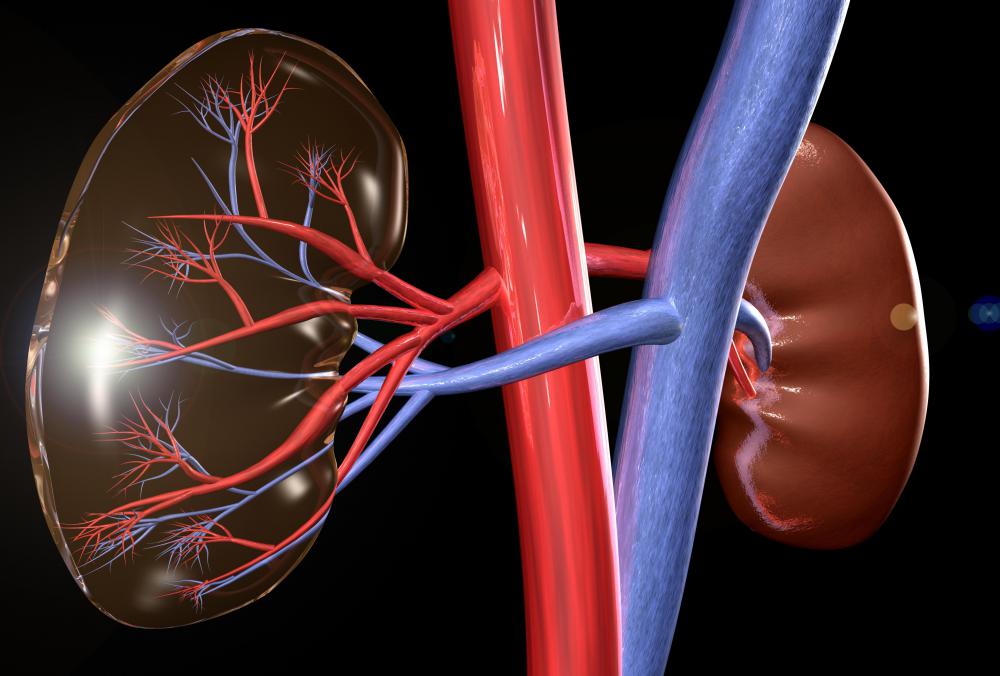At WiseGEEK, we're committed to delivering accurate, trustworthy information. Our expert-authored content is rigorously fact-checked and sourced from credible authorities. Discover how we uphold the highest standards in providing you with reliable knowledge.
What is Lupus Nephritis?
Lupus nephritis, also known as lupus glomerular disease, is a complication of systemic lupus erythematosus (SLE) that adversely affects kidney function. The condition originates with the accumulation of protein-laden autoantibodies within the capillaries of the kidneys directly affecting urine composition and blood pressure. Treatment for individuals with lupus nephritis involves restoring proper kidney function through the use of prescription medications. If the condition has progressed to induce kidney failure, dialysis and transplant may be viable treatment options.
Normally, the body's immune system works as a defense against harmful substances, such as bacteria and other germs. For individuals with SLE, the immune system is unable to distinguish the presence of harmful substances and mistakenly attacks healthy tissues and cells. Symptoms associated with this autoimmune disorder may vary from individual to individual and initially affect either a single organ or the entire body. Of the many symptoms associated with this inflammatory condition, kidney disease is among the most severe and life-threatening. Those diagnosed with SLE may undergo periodic testing, such as urine and blood analysis, to evaluate their kidney function.

Impaired kidney function manifests with excessively high concentrations of protein in the urine. Individuals with kidney inflammation associated with SLE may remain asymptomatic at first, meaning they experience no symptoms at all. With time, the individual may develop a variety of symptoms that directly affect his or her urine production and output. Signs such as foamy urine or urine containing blood may be indicative of impaired kidney function. Additional symptoms may include generalized or localized swelling, also known as edema, and high blood pressure.

A variety of tests may be performed to confirm the presence of decreased kidney function. Individuals experiencing associated symptoms may undergo a physical examination and blood and urine analysis. A physical examination may be conducted to evaluate blood pressure, assess any swelling, and determine if there is any fluid buildup in the heart or lungs. Urine and blood analysis may be conducted to evaluate levels of antinuclear antibodies (ANA), urea nitrogen, and creatinine. Upon diagnosis confirmation, a kidney biopsy may be performed to evaluate an appropriate course of treatment.

The goal of any treatment regimen for lupus nephritis involves restoring proper kidney function. Prescription medications may be administered to alleviate inflammation and suppress the immune system. Some individuals may need to undergo permanent dialysis to control symptoms associated with their impaired kidney function. A kidney transplant may be a viable treatment option for severe cases involving individuals with inactive SLE.

Complications associated with lupus nephritis may include acute or chronic kidney failure and end-stage kidney disease. Prognosis associated with lupus nephritis is dependent on the extent of the condition and the overall health of the individual. Those who experience sudden, or acute, episodes of inflammation may have periods where they are asymptomatic and able to manage their symptoms with medication. Others may be diagnosed with chronic kidney failure requiring more concentrated treatment. Individuals who undergo a kidney transplant may experience a recurrence of kidney inflammation resulting in a worsening of symptoms.
AS FEATURED ON:
AS FEATURED ON:















Discuss this Article
Post your comments